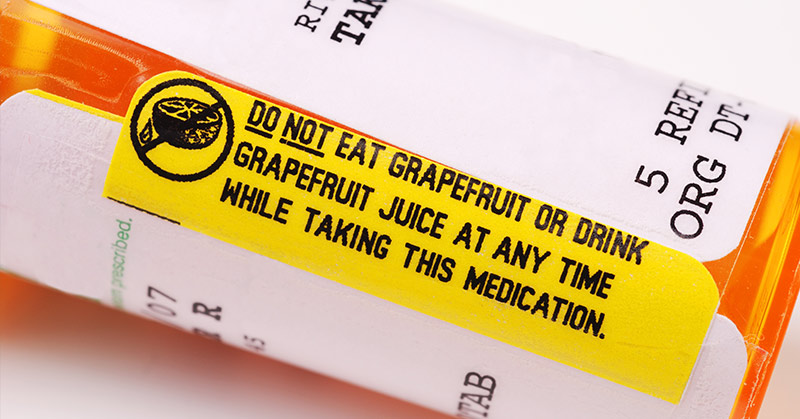While grapefruit is praised for being a low-sugar, beneficial fruit with plenty of vitamin-C, potassium, and fiber – if you’re taking certain medications, this seamlessly healthy fruit, can become rather dangerous.
Why are the natural components of grapefruit so risky?
While grapefruit does not directly alter your medication, it does interact with an enzyme in your intestinal tract known as CYP3A4 [1]. This enzyme, when working normally, regulates how much of certain medications get absorbed into the bloodstream. However, when grapefruit is consumed, it blocks the actions of this enzyme allowing for greater absorption of your medication [1]. While this sounds like a benefit, it is not. Dangerous levels of medication can easily accumulate in your blood leading to problems.
So if you enjoy the sour and tangy delights of a grapefruit before your daily medication, it will actually boost some medication, and make it easier for certain drugs to pass from your gut into your bloodstream.
Here are a few of the most important medications which can be boosted from grapefruit juice, and some which are not as likely to be influenced:
| Grapefruit and Medication Interactions | ||
| Drug Category | Boosted by Grapefruit | Little or No Interaction |
| Calcium channel blockers (high blood pressure, angina) | Felodipine (Plendil) Nifedipine (Procardia, Adalat) | Verapamil (Calan, Isoptin)Diltiazem (Cardizem)Amlodipine (Norvasc) |
| Statins (high cholesterol) | Atorvastatin (Lipitor)Simvastatin (Zocor)Lovastatin (Mevacor) | Fluvastatin (Lescol)Pravastatin (Pravachol)Rosuvastatin (Crestor) |
| Immunosuppressants (to prevent rejection of transplanted organs) | Cyclosporine (Sandimmune) | |
| Benzodiazepines (anxiety, insomnia) | Diazepam (Valium)Triazolam (Halcion)Midazolam (Versed) | Flurazepam (Dalmane)Clonazepam (Klonopin) |
| Other neurological and psychiatric medications | Buspirone (BuSpar)Sertraline (Zoloft)Carbamazepine (Tegretol) | Haloperidol (Haldol)Trazodone (Desyrel)Zolpidem (Ambien) |
This chart can originally be found here
It should be noted that it really doesn’t take much grapefruit to have an impact when it comes to susceptible medications. Just a single cup of this juice can produce a 47% reduction in the intestinal enzyme which regulates absorption. One study found that when a certain statin was taken with 200ml of grapefruit juice daily for 3 days, it lead to 330% higher amounts throughout the body [2]. This goes to show that effects can linger as well, after consuming a serving of grapefruit its effects can remain for 24hrs.
If you think grapefruit it the only fruit to look out for, you’d be wrong. Limes, pomelos and Seville oranges also contain furanocoumarins, the same type of compounds found in grapefruit [2].
Do you feel you shouldn’t have to choose between your medications and your beloved grapefruit? Well, if you’re that passionate about it your only possible choice would be to switch your medication to one that does not interact, and for that, you need to speak with your doctor. Alternatively, you can also switch to other types of low furanocoumarin fruit, or even better – a fresh-pressed vegetable juice!
If you’re unsure about how certain foods or drink interact with your medication, be sure to speak with your doctor.
Disclaimer: This information is not intended to be a substitute for professional medical advice, diagnosis or treatment and is for information only. Always seek the advice of your physician or another qualified health provider with any questions about your medical condition and/or current medication. Do not disregard professional medical advice or delay seeking advice or treatment because of something you have read here.

